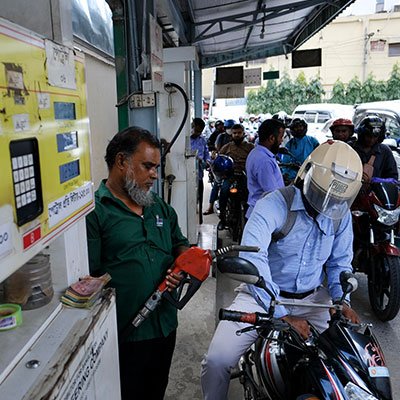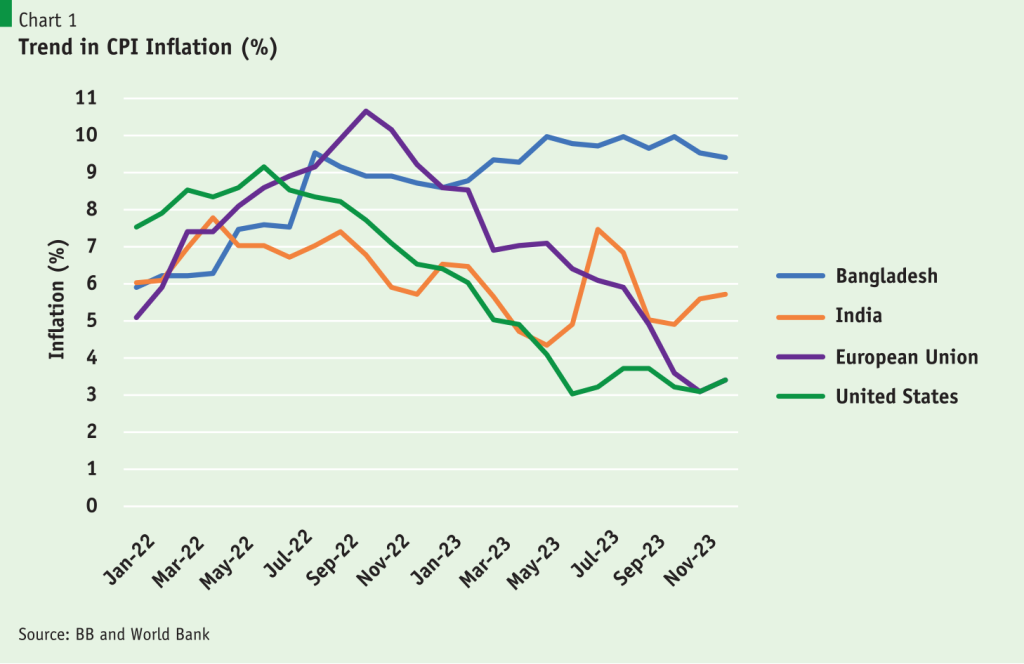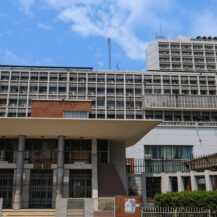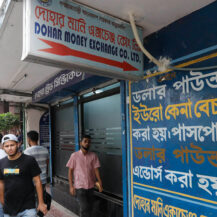Taming the Inflation: Let the Orthodox Monetary Policy Work
By
Bangladesh has been experiencing rising inflationary pressure for at least the last 18 months. In fact, monthly inflation reached as high as 9.97% in (May 2023) and still remains stubbornly high at 9.86% in January of 2024. Uncontrolled inflationary pressure remains one of the most problematic phenomena. Lessons from economic history vividly demonstrates that high inflation can hinder macro-economic stability, erode competitiveness of local entrepreneurs, demotivate investment decisions and accentuates income inequality by substantially reducing the purchasing power of fixed-income and financially weak households.
Thus, it is not surprising that mature monetary regimes across advanced economies commit to an inflation targeting framework where the primary agenda is to keep inflation at about 2% annually. This also explains why recently central banks across advanced economies have responded aggressively to tighten the money supply and raise the interest rate, which translated into lowering the inflationary pressure in their respective economies. Interestingly, this also creates a useful context for evaluating the effectiveness of our monetary policy that has been largely ineffective in controlling inflation.
More plainly, given global inflation has been coming down over the last 18 months, why is inflation in Bangladesh maintaining an upward trend since mid-2022? In other words, why is inflation in countries like India and Sri Lanka less than 6% while it remains above 9.6% in Bangladesh? What explains this divergence?
In other words, why is inflation in countries like India and Sri Lanka less than 6% while it remains above 9.6% in Bangladesh? What explains this divergence?
To decode this heterogeneity in monetary performance this analysis will offer insights on three core issues: i) the set of factors that have driven the global inflationary pressure and how it was addressed by the central banks across countries. In particular, we try to distill the broad lessons that emerge from the international experience; ii) the set of factors that have driven the inflationary pressure in Bangladesh and why Bangladesh Bank has failed to tame the inflationary pressure; and iii) the exact policy decisions that might help bring the current inflationary pressure under control.
Drivers of Global Inflation and Lessons for Monetary Policy
There is now a consensus among experts that excessive fiscal and monetary stimulus in response to Covid-19 along with the supply-chain disruptions stemming from the aftershocks of Covid-19 and Ukraine-Russia War fuelled this spike in inflation across countries. The initial expectation that the inflationary spike is a transient phenomenon did not come true and advanced economies started preparing for the worst-case scenario – stagflation – where it was expected that inflation and unemployment rate will rise and remain high simultaneously. This prompted central banks in advance countries to raise their respective interest rates and commit to a contractionary monetary policy, given from the standpoint of macro-economic management – inflation is seen as a more dangerous problem than unemployment. 
For instance, inflation in the United States reached as high as 9.1% in June of 2022 – the highest in 40 years. Responding to this growing crisis the Fed increased its policy rate eleven times to a range of 5.25 to 5.5%– the highest policy rate in the last 23 years. Consequently, inflation since then has decreased substantially as it has come down to 3.1% in January of 2024. Even in India, over the same time span, inflation came down from 7.7% to 5.1% – responding to the Reserve Bank of India decision to increase the policy rate to 6.5%. A similar phenomenon was also observed for the European Union where contractionary monetary policy has brought down inflation from 11.50% in the October of 2022 to 3.1% in the January of 2024.
It is also interesting to underscore that in the US, European Union and India – inflation management through contractionary monetary policy did not result in any serious spike in unemployment or nosedive in economic growth – and the noted regions have achieved an economic ‘soft landing’ – a phenomenon that has pleasantly surprised policymakers who expected costly growth implications of a sustained contractionary monetary policy stance.
Of course, not every nation-state crafted a similar response for inflation management. Turkey boldly and quite foolishly did what no one expected – its central bank under pressure from President Tayyip Erdogan decided to lower interest rates despite inflation rates of 20% – arguing that such measures will help increase investments and smoothen supply-side constraints. But this unorthodox monetary policy experiment did not work and inflation increased to 80% in 2022. Subsequently, Turkey has corrected its earlier devastating monetary policy blunder by increasing its interest rate to 40%, which has triggered a downward trend in its inflation rate (standing currently at 65%).
On the whole, the global downward trend in inflation validated the effectiveness of orthodox monetary policy which views inflation as a largely monetary phenomenon and supports inflation management through contractionary monetary policy stance.
Drivers of Inflation in Bangladesh and Response of Bangladesh Bank
As the inflationary pressure in Bangladesh remains sturdy, it is essential to pinpoint its possible drivers. According to the latest monetary policy statement published by Bangladesh Bank, our inflationary pressure is fueled by three key factors: i) supply-chain disruptions stemming from post-Covid demand spike and Ukraine-Russian war ii) exchange rate depreciation due to higher import bills in FY2022 (which could have been due to money laundering through over invoicing of imports); and iii) a sharp energy prices adjustments after the Ukraine-Russia war.
This we believe is an accurate but an incomplete assessment as it ignores a number of key additional issues that have seriously compromised the authorities’ efforts to contain inflation. These are: i) keeping the interest rate structure administratively fixed in the 6%–9% range for a long time ignoring the global developments and the post-Covid surge in domestic inflation; ii) keeping the exchange rate virtually fixed against the dollar for almost 12 years contributing to a massive balance of payments imbalance and a sharp depreciation of Taka; iii) injection of substantial monetary stimulus to navigate the economic effects of Covid-19, which was necessary at that time but was not sterilised subsequently; iv) printing of high-powered money by Bangladesh Bank for lending to the government to compensate for revenue shortfall in FY2023; and v) injection of emergency funds through promissory notes into troubled Islamic Banks in December 2022 and December 2023 partially off-setting the efficacy of the contractionary monetary policy stance of Bangladesh Bank. Collectively, these issues need serious recognition in policy formulation.
It is also essential to underscore that Bangladesh Bank’s initial narrative that the inflation was transitory due to external supply shocks and would unwind with supply situation improving was wrong. Thus, Bangladesh Bank’s earlier reluctance to remove the 6%–9% interest rate band undermined its fight against inflation. The unchanged interest rate policy also widened the interest rate differential in favour of the dollar thereby undermining the authorities’ efforts to limit the depreciation of Taka by making taka less attractive against the dollar. The unfavourable return on Taka assets coupled with the exchange rate depreciation turned the financial account of the balance of payments significantly negative for the first time in many decades accentuating the pressures on foreign exchange reserves and the exchange rate as short-term capital inflows dried up. Since up to 40% of the inflation could be attributed to the 30%–35% depreciation of the Taka, an aggressive interest rate policy could have a dampening impact on the inflationary pressure.
The unfavourable return on Taka assets coupled with the exchange rate depreciation turned the financial account of the balance of payments significantly negative for the first time in many decades accentuating the pressures on foreign exchange reserves and the exchange rate as short-term capital inflows dried up.
Going forward, it is encouraging to note that Bangladesh Bank has moved away from its earlier narrative and has announced the adoption of a tighter monetary stance in its latest Monetary Policy Statement. The authorities have already abandoned the 6%–9% interest policy band, have announced that there would be no recourse to central bank borrowing for budget financing and the resulting bank financing of the budget deficit has contributed to a significant increase in the interest rates on Treasury Bills and Bonds.
The green shoots of macroeconomic stabilisation is already visible in the form of: i) external current account is in surplus due to import compression; ii) stabilisation of the official foreign exchange reserves at around USD 18–USD 20 billion level; iii) an apparent stabilisation of the exchange rate around BDT 120–124 per dollar for the last 3 months; and iv) an upgradation of the outlook for the banking sector by Moody’s due to increased profitability, some recovery in bank deposits and improved liquidity situation, all resulting from the abandoning of the 6%–9% range for interest rates.
Given the gains already visible, Bangladesh Bank needs to go further to consolidate the gains. The post-election hike in the policy rate by 25 basis points was too little too late. The policy rate should be increased in steps of 50 basis points per month for the next 4 months before considering a pause in the policy rate increase. The basic principle should be to ‘continue increasing the interest rate until the inflation rate comes down close to the target range’. We are still very far from that.

The agenda for restoring macroeconomic stability including price stability—in addition to interest rate hikes—will require i) unification of the exchange rate in the interbank market; ii) a sizable cut in non-essential fiscal spending; and iii) refraining from central bank financing of the budget deficit despite the expected pickup in budgetary spending in the final quarter of FY2024. Notwithstanding the initial hesitations and delays, the authorities’ current policies are in the right direction and working. What is needed is to strengthen the orthodox policy measures further along the lines described above and allow for 6–9 months of time for the policies to deliver the desired results.





